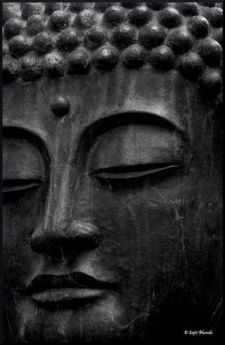Posts Tagged ‘“The Buddha”’
Mindfulness !
“Do not dwell in the past; Do not dream of the future; Concentrate your mind on the present moment” – The Buddha
Living in the moment is the essence of living, the Buddha taught. What is really stored in a moment? What does it consist of? I was thinking about these questions for quite sometime. Few months earlier, I registered with the Art Of Living course, where our teacher discussed the same idea – one about living in the present. Snapping his fingers, he asked us a question, “What am I doing now?” We answered, “Snapping your fingers” Teacher said, “That was a moment ago. What am I doing at this very moment?” He expounded that if we observed closely – there was nothing in a moment and yet a series of moments became the powerful experiences and impressions that shaped our lives. Later that day, we played a simple game of ‘River and Bank’, where we were asked to move forward or backward, when the instructor says words River or Bank respectively. Anyone who misses was out of the game. After the game teacher asked us, “How many of you were thinking about worries and problems in your lives?” None of us did. During these events, we were doing two seemingly different activities, in the first, we were paying attention to a single moment and in the later we were completely absorbed in the moment. But there is a common thread; our mind was in the present state in both, not wandering into the past or future. Those events gave me the first glimpses of what living in the moment might be or what the Buddha might have meant by Mindfulness. Of course, we all experience such moments time and again, for some it may be singing, painting, or dancing. And for some others it may be programming, listening to a song, or watching some great performance. In all such moments we truly are in the present state, living life to the fullest.
In Buddhism, mindfulness is one of the seven factors of enlightenment. Also, it is one of the most important aspects of the forth noble truth – the noble eightfold path. In the path to enlightenment, right mindfulness is an essential step before one achieves equanimity towards all facades of life. Essentially, it is a practice, which helps one become consciously aware of her body, feelings, and emotions. You pay conscious attention to the processes inside and around you. The mind becomes still, like a perfectly serene surface of a lake, ready to detect every minute movement of a thought. In this halcyon state, when you listen, you listen to the noise, birds, nature, people – but just listen. The mind never intercepts the listening and does not offer any conclusion. When seeing, you pay attention to the smallest detail, insects, flowers blooming, and very subtle expressions on the faces – but just see. The prejudices and stimulations are consciously observed and avoided, until they completely disappear. You become the passive observer of everything within and without. Sylvia Boorstein, a great meditation teacher and the author of many spiritual books, describes mindfulness in these words:
“Mindfulness is the aware, balanced acceptance of the present experience. It isn’t more complicated than that. It is opening to or receiving the present moment, pleasant or unpleasant, just as it is, without either clinging to it or rejecting it.”
The Buddha has always placed importance on balanced and alert mind. Mind that is free of prejudices, desires, and turmoil. Unfortunately, for most of us that is not the case. Our mind is full of cravings. Past events stirs archetypal memories. Future events cause anxiety. It constantly gets stimulated through various sources and immediately reacts to individual stimuli. According to the Buddha, this chaotic state of mind is one of the main causes of suffering. The practice of mindfulness prepares us towards peaceful and unruffled mind. In this practice, the mind accepts the stimuli and does not do anything with it. Buddha says in such a state, you can truly live the moment. The key here is to understand the flux of life. You never cling on to anything, not even to your identity. The story goes that once the Buddha was in an assembly and a person looking very furious walked in. He was very angry, because he thought his children were wasting time with the Buddha, instead of helping him in his business. In extreme anger, he could not say anything and just walked towards the Buddha and spat on him. All the disciples were very angry, but the Buddha was calm and did not say a single word. He simply looked at the person and smiled. The person was very surprised by the reaction of the Buddha. Later he felt very embarrassed by his actions, and went again to the Buddha to apologize. He fell at the Buddha’s feet and said, “Lord please forgive me” The Buddha said, “I can not forgive you.” Everyone was surprised, how can compassionate Buddha be so unsympathetic? The Buddha smiled and said, “I cannot forgive you, because the person who spat wasn’t you and the person who you spat on isn’t Me.”
Of course, it is really hard to attain the state, where we are completely unattached to our identity. And it is even harder to live life in detached moments. But the partial state can be achieved by practicing mindfulness regularly. The Zen Buddhist masters suggest practicing it early in the morning. When you wake up – before even opening your eyes – start observing various processes inside your body. Try to feel sensations in your body. Be aware of the state of the mind. Concentrate on your breath for couple of minutes and feel the rhythm of it. Feel how your body is getting into the rhythm and how breath plays an important roll in this process. There are many ways of practicing, but the essence is to become a detached observer for at least few minutes during the day.
One of the major obstacles in life is our dived attention towards everything. Something else is always important than the current moment. When at work, family is more important. When with friends, work is essential. When meeting people, individuals are least important. Every handshake, every smile, every situation needs your sincere attention. We should be able to listen every word whispered and unwhispered. The practice of mindfulness helps us to be more attentive towards little things in our lives. It helps us increase, what Stephen Covey calls ‘space between the stimulus and response’. What that means is our reactions to the situations, problems, and emotions become more thoughtful. We become more patient and choose our responses carefully. It helps in avoid becoming victims of sudden burst of anger. It improves your concentration and makes you more focused. Your anxieties and tensions slowly start disappearing. This space helps us in every aspect of our life, from loosing weight to avoiding that confrontation.
Each one of Buddha’s teaching – even the most abstract and abstruse – has a practical use. Practice of mindfulness helps you in accepting the ever-changing reality with the realization that you never step in to the same river twice. It is an effective way of living life to the fullest. The Buddha had taught so many of these beautiful practices, which are more relevant today than ever. These practices can make a world of difference in our lives. We need to make just a little effort towards learning. A little effort towards self-discipline. But again, as the Buddha said – “I can give my teachings in brief. I can teach in detail. It is those who understand that are hard to find.”
—
Sujit Bhosale


